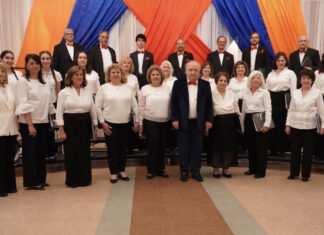By Aram Arkun
Mirror-Spectator Staff
ENGLEWOOD, N.J. — A new production of William Saroyan’s “My Heart’s in the Highlands” was presented in Western Armenian translation on June 26 and 27 by the Mher Megerdchian Theatrical Group of the Tekeyan Cultural Association here at the Dwight-Englewood School. On June 27, as many as 250 people were in the audience. The local theater troupe was augmented through the participation of noted actor Hovhannes Babakhanyan of Yerevan, and his family. Babakhanyan served as director of the production, as well as one of the lead actors.
The play, although ostensibly set in 1914 Fresno, is really about the Depression era. It was originally written by Saroyan as a short story and published in 1936, while the play version was published three years later. The plot is less important than the sentiments and ideas conveyed, making it a little hard to follow at times. One of its main ideas is the triumph of artistic creation over material difficulties, and the importance of art to ordinary people.
Babakhanyan, who gave an interview to the Mirror-Spectator after his performance, feels that “Highlands” is an important play for Armenians. The title of the play — the notion of hearts being “in the highlands” — refers to the longing for one’s native land, no matter where one is: “When we are young we don’t feel it. After the age of 40 to 45 years, we begin to feel it. Our ancestors were buried in those lands. We grew up and ate apricots from the trees growing there where our ancestors lie. Eventually the cycle repeats. Somehow this must affect us not only physiologically but psychologically. This is why Armenians from the diaspora who never have been to Armenia suddenly start crying when they arrive.”
Even more interesting, he feels, is the fact that William Saroyan’s own heart was buried after his death in Yerevan — therefore in this case, Saroyan literally made sure his heart ended up in the highlands.
Karnig Nercessian, who played the elderly and homeless Jasper MacGregor in the performances, later added: “This play reveals a truth in Armenian history — poverty and homelessness. Saroyan saw it all himself.” He also felt that the meaning of “my heart’s in the highlands” is that nobody really dies. Their heart or soul always lives on in the highlands even when their body is gone.







